The Sustainable Diner Summit, Beyond Research: Sustainability in the Food Service Sector
March 2020
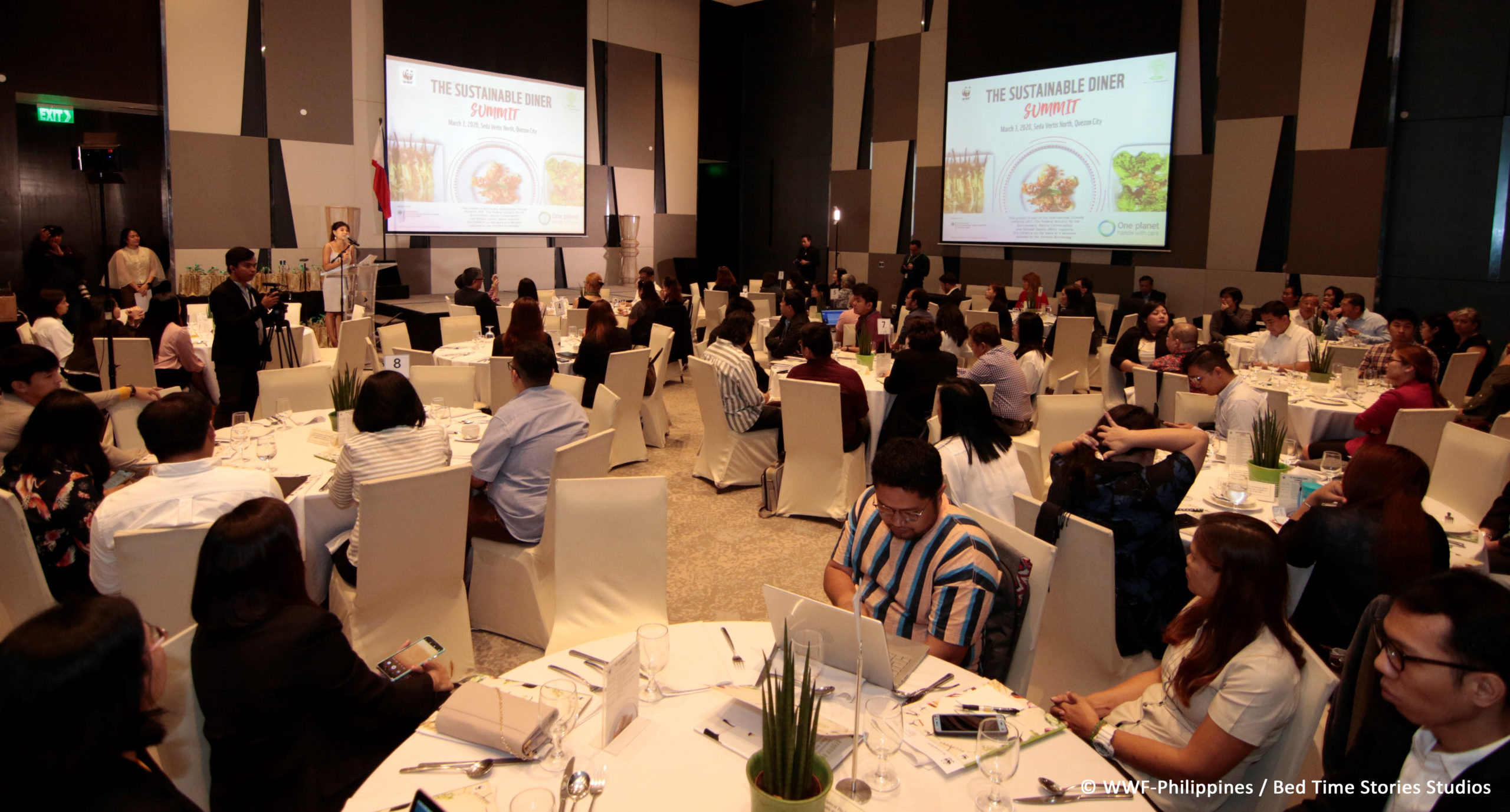
The summit aimed to gather project partners for a learning and sharing event and to increase the awareness of target stakeholders at the national and local levels to help better sustain and scale up the implementation of long-term SCP policies and strategies supported by scientific data and an evidence-based approach.
On March 3, 2020, the World Wide Fund for Nature (WWF) Philippines, through The Sustainable Diner: A Key Ingredient for Sustainable Tourism project, brought together partners in The Sustainable Diner Summit with the theme, “Beyond Research: Sustainability in the Food Service Sector”, held at Seda Vertis North, Quezon City. The event aimed to recognize the advocacy partners and to report back the results of action research to the project stakeholders.The participants were from national agencies and local government units; the food and beverage industry; hospitality industry; the academe; civil society; and the media.
Mr. Joel Palma, Executive Director of WWF-Philippines, welcomed the participants of the summit. He hoped that the summit will propel everyone in attendance to do more action for the environment and for the future of the Philippines. The Sustainable Diner project’s highlights and updates were presented by Ms. Melody Melo-Rijk, WWF- Philippines’ Project Manager for Sustainable Consumption and Production in the Philippines. “The goal is to ensure that we integrate and promote sustainable consumption and production for policies, may it be national or local, and for the food service operations. At the end of the day, we can’t do this alone, and as we say in WWF, together, everything is possible”, says Melo-Rijk.
Various project stakeholders shared short messages to discuss the established partnerships in building Sustainable Consumption and Production strategies. The journey towards the sustainability of the food service sector was made possible through the support of the German Environmental Ministry through their International Climate Initiative (IKI). With this, H.E. Anke Reiffenstuel, Ambassador Extraordinary and Plenipotentiary Embassy of the Federal Republic of Germany-Manila, emphasized the importance of collaboration and partnerships involving different sectors. “We are looking forward to this partnership that would be able to grow further with new projects because it is important to take the step up from raising awareness to action, and what we see here today is really taking action on concerns that matter to everyone. And with this climate change-related project and event, I always would like to quote one of the German activists where she said, “We are the ones that we have waited for so long to change the world, so let’s do it together.” and this is also true for this project so I’m looking forward to being a partner in this.”
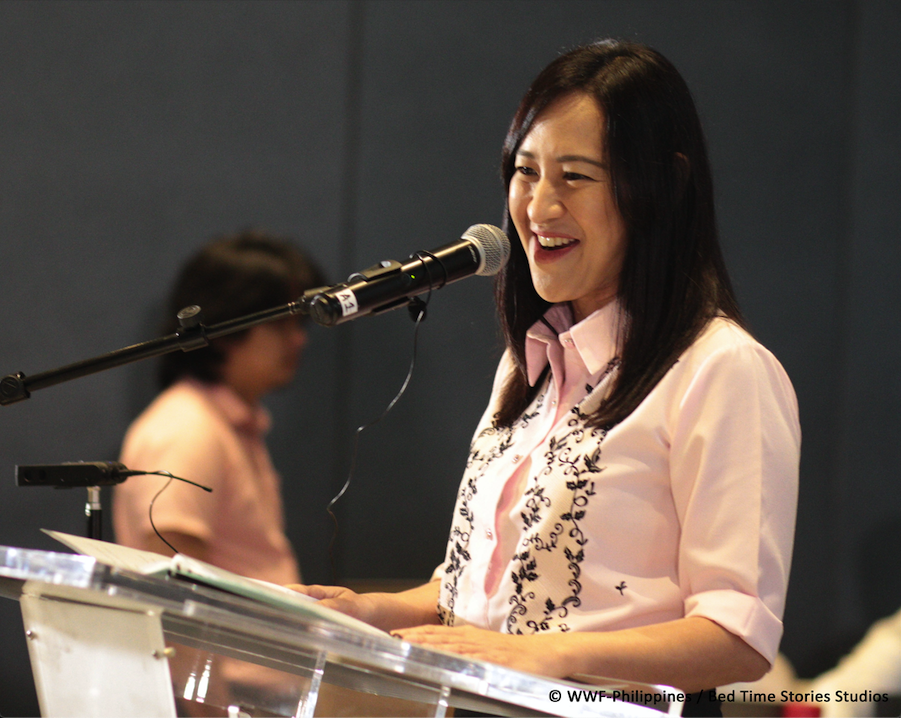
Hon. Maria Josefina Belmonte, Mayor of Quezon City, delivered a message to the plenary about the different initiatives and ordinances of the city government when it comes to implementing sustainable practices as part of their strategies.
What The Sustainable Diner project has achieved so far would not be possible without the strong partnerships built with several national and local government agencies. Hon. Maria Josefina Belmonte, Mayor of Quezon City, discussed how it is truly empowering to see representatives from different sectors gather for the promotion of sustainable consumption and production. “I hope for a stronger partnership with everyone here. May this also inspire us to think of innovative ways to do our part in tackling food waste, food loss, and food security issues,” says Belmonte. Quezon City wants to take the lead as a sustainable city, with Mayor Belmonte sharing the different initiatives and ordinances of the city government when it comes to implementing sustainable practices as part of their strategies.
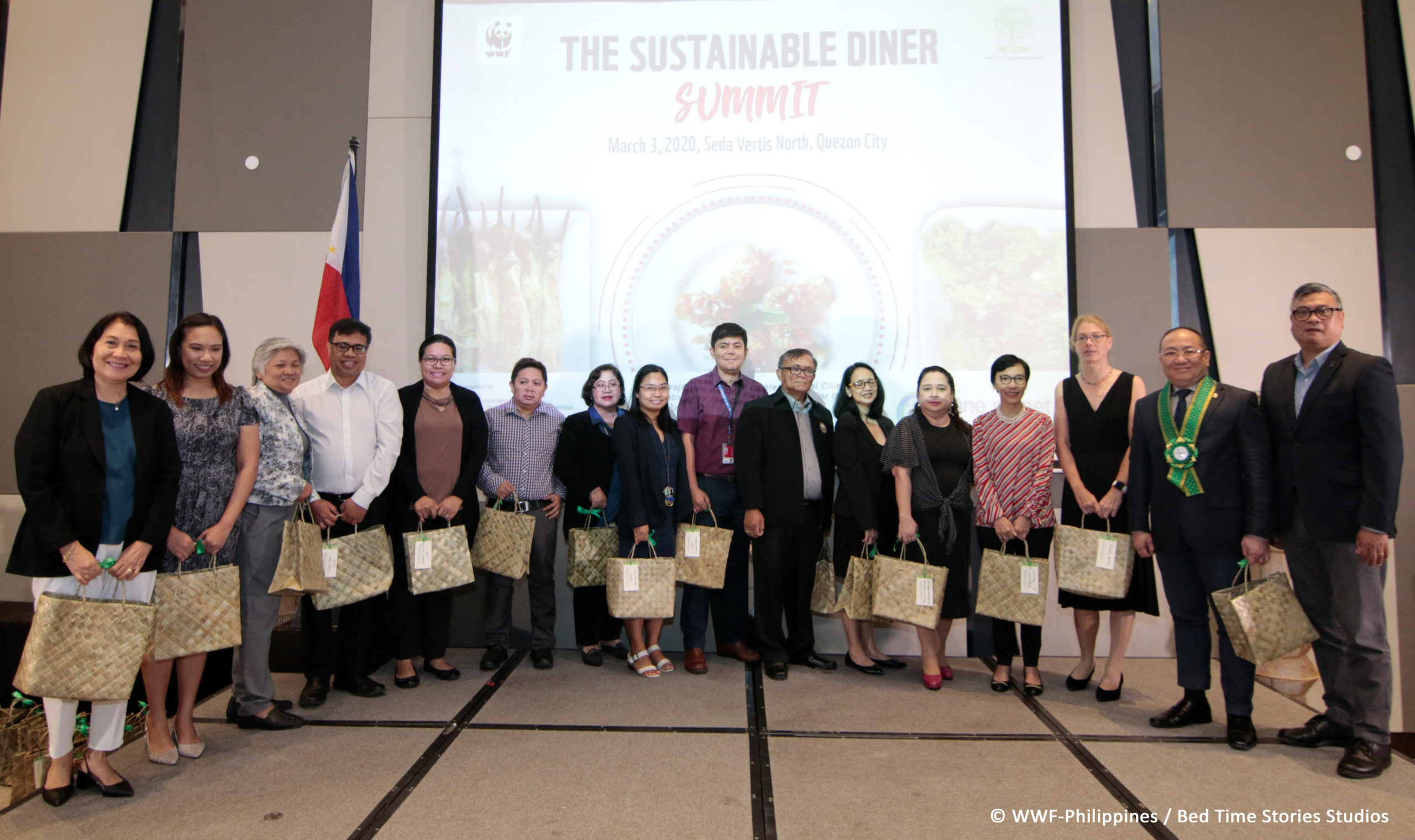
The event aimed to recognize the advocacy partners and to report back the results of action research to the project stakeholders.The participants were from national agencies and local government units; the food and beverage industry; hospitality industry; the academe; civil society; and the media.
The partnership with the Department of Tourism (DOT) is also essential for scaling up and contributing to working towards the integration of Sustainable Consumption and Production in the Tourism sector. This was done successfully through the support of Hon. Maria Rica Bueno, Assistant Secretary for Tourism Regulation Coordination and Resource Generation of the Department of Tourism. “WWF-Philippines find ways to lessen food waste and improve the implementation of sustainable consumption and production processes in the food service sector. The event that we’re taking part in today was born out of this noble initiative. The Sustainable Diner focuses on a collaborative multi-sectoral approach engaging the government, the food service industry, and the consumers in promoting sustainable dining practices to help build a more socially responsible food service industry,” says Bueno. “Beyond the Department of Tourism’s mandate to carry out the development and promotion of the country’s tourism industry, we have embraced sustainability and advocacy as the highest priority. We want to promote a tourism industry that is ecologically sustainable, responsible, participative, culturally-sensitive, economically viable and perhaps more importantly, ethically and socially equitable for our local community.” The strengthened partnerships with National Government Agencies have been a great support to promote the integration of Sustainable Consumption and Production in the food service sector. With this, Hon. Emmanuel De Guzman, Secretary of Climate Change Commission, discussed some facts on the climate emergency including their initiatives and plans towards mitigation and building a sustainable nation.
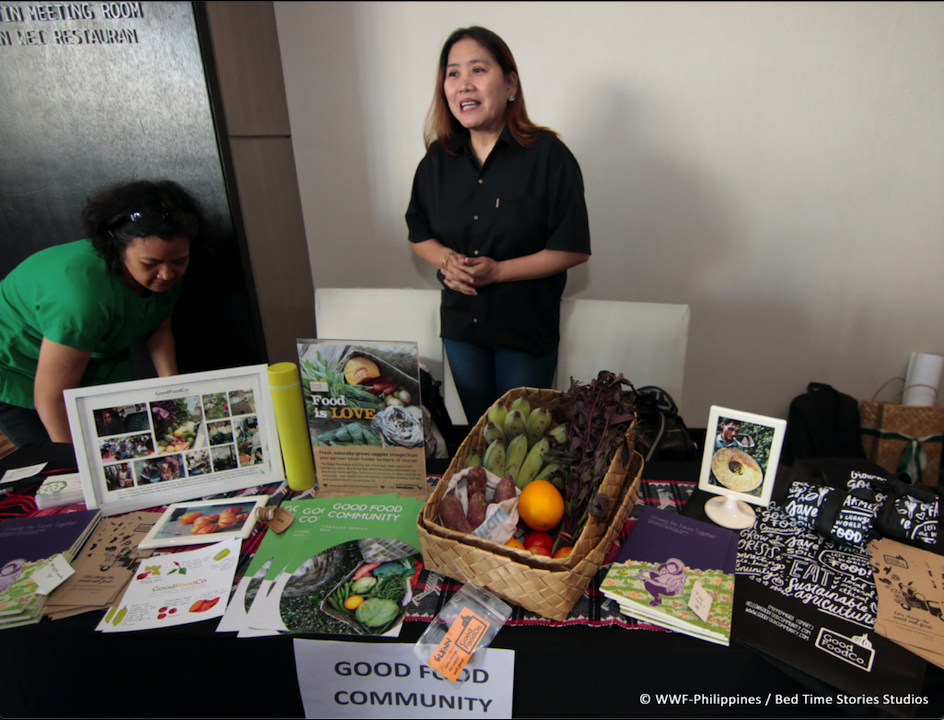
Good Food Community showcased their sustainable and locally crafted products.
As part of the event, different sustainable merchants sold a diverse range of locally-produced and crafted products, which included BukidFresh, Good Food Community, Hineleban Manila, EcoNest Ph, Greener Genes, The Bamboo Company, Quanta Paper, and Green Space. The event was hosted by Jessica Haley Ordoñez, WWF-Philippines’ Brand and Innovative Partnerships Assistant.
The summit presented the action research studies developed by The Sustainable Diner Project team in collaboration with its consultants through intensive research, analysis, and learning experience from the project since its inception in 2017. It focused on establishing a low carbon food service industry in the Philippines, namely:
- Food Waste Management Case Study presented by Ms. Melody Melo-Rijk and Ms. Leah Magallanes of SMHCC. What SMHCC has done shows that addressing food waste really requires leadership and commitment, but the fruits of that labor are truly rewarding for the triple bottom-line of profit, people, and the planet.
- Feasibility Study on Food Donation Program by GECC Environmental Services presented by Ms. Annabelle Vitti Valenzuela. It is amazing how we can help cut down on emissions and feed the food-poor whenever we share food that is safe for consumption. Clearly, sharing food has social and environmental benefits.
- Cost-Benefit Analysis of Sustainable Business Approaches by Mr. Bing Icamina, Chief Economist, Vice President and part-owner; and Ms. Melvie Espejo, General Manager and Head of Research, both from The Wallace Business Forum. It’s interesting to see how sustainability is an endeavor that is not only good for our society and the planet, but for our pockets as well. After all, if we think about it, practicing sustainability is about trying to lessen our use of resources, so it would really entail less expenses.
- Food Service Life Cycle Assessment by Dr. Alvin Culaba, Chairperson of the Technical Committee of the National Ecolabelling Program of the Philippines and a Trustee of the Philippine Center for Environmental Protection and Sustainable Development, Inc. (PCEPSDI). In order for the industries to measure their environmental impacts, there is now a tool we call the Life Cycle Analysis or LCA. It is also an information tool used to inform consumer decisions using product declarations and environmental performance indicators.
- Ecolabelling Criteria for Food Service by Ms. Maureen Grace Lebria, Programme Manager of the National Ecolabelling Programme-Green Choice Philippines and the Programmes and Project Director of the Philippine Center for Environmental Protection and Sustainable Development, Inc. As emphasized by the Life Cycle Analysis, sustainability is a process. Some products are more preferable than others because of its minimized effects to the environment. This is why it is crucial that we guide the consumers to these products and services that are proven to be good for the environment. As we face the worsening climate crisis, it is important for the consumers and businesses to actively take part in carrying out solutions to help save our planet. With this, the green seal could help us achieve these goals.
Environmental Teaching Manuals for Primary and Secondary School Teachers by Mr. Alfred Johann Lee, a former teacher, and a freelance writer, editor, and graphic artist. To address environmental issues, knowing and understanding the concepts and issues is the first step. In the Philippines, there are still knowledge gaps when it comes to these things. It’s this hurdle that led the team to realize that in order to have a long-term impact, there is a need to educate young minds on what sustainability is in general, and how it connects to food. From this line of thinking, the idea for the environmental teaching manual was born.
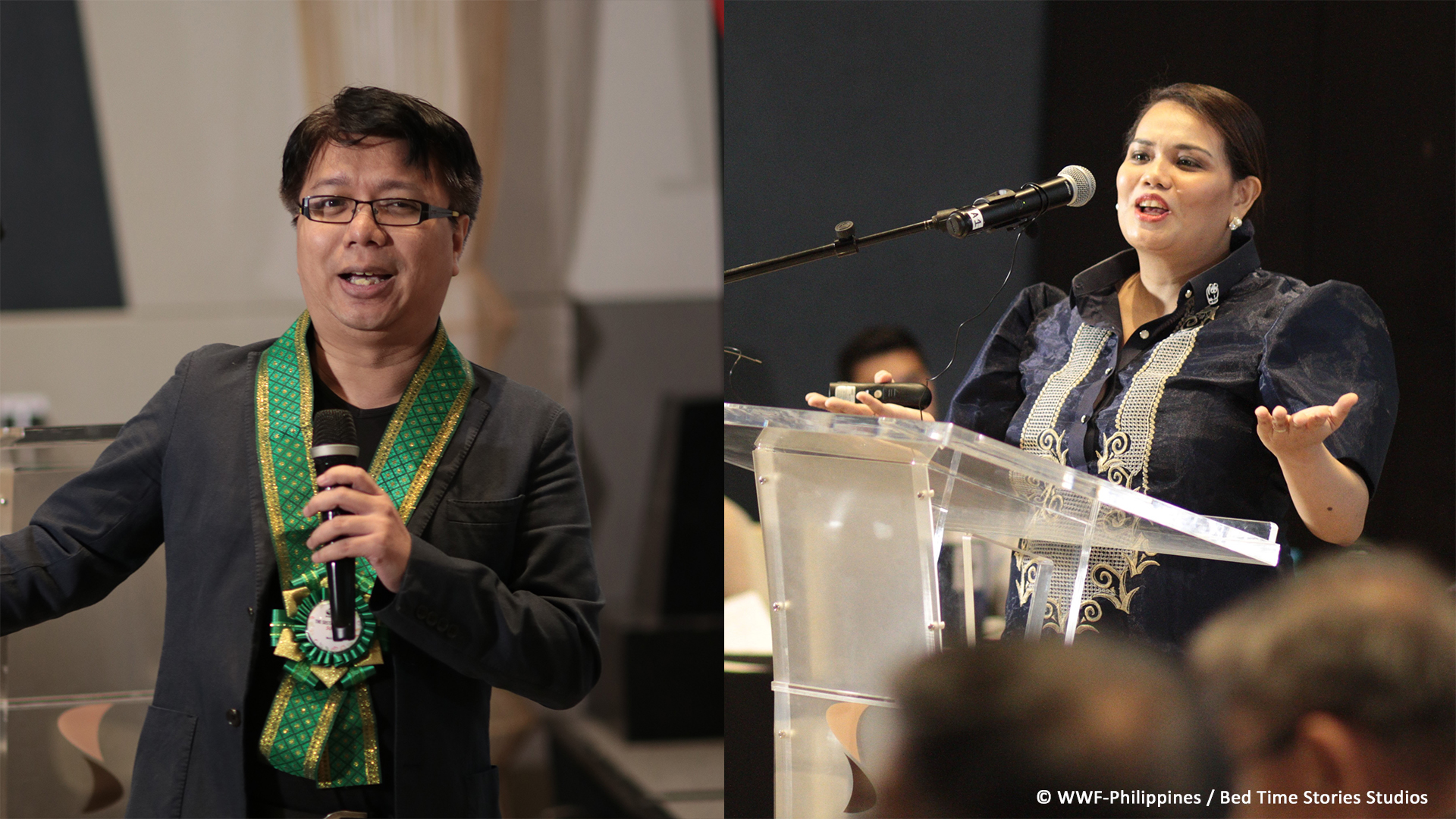
(Left) To address environmental issues, knowing and understanding the concepts and issues is the first step. In the Philippines, there are still knowledge gaps when it comes to these things. Mr. Alfred Johann Lee, a former teacher, and a freelance writer, editor, and graphic artist presented the Environmental Teaching Manuals for Primary and Secondary School Teachers. (Right) Ms. Melody Melo-Rijk of The Sustainable Diner project presented the Food Waste Management Case Study including project highlights and updates.
The presenters informed the participants of the sustainability principles being applied in the business operations of the partner restaurants. Ms. Luz Teresa Baskinas, WWF-Philippines’ Head for Project Development, delivered a synthesis of everything that was presented. A resource material on compilation of digests of action research studies which were presented can be accessed here: Beyond Research: Sustainability in the Food Service Sector - A Resource Material towards a Low-Carbon Industry.
Overall, the summit aimed to gather project partners for a learning and sharing event and to increase the awareness of target stakeholders at the national and local levels to help better sustain and scale up the implementation of long-term SCP policies and strategies supported by scientific data and an evidence-based approach. This contributed to the Sustainable Development Goals, particularly Goal 12, which focused on Sustainable Consumption and Production in the Philippines.
The Sustainable Diner project, under Sustainable Consumption and Production, is part of the International Climate Initiative (IKI). The Federal Ministry for the Environment, Nature Conservation, and Nuclear Safety (BMU) supports this initiative on the basis of a decision adopted by the German Bundestag.
For more information, please contact:
Ms. Melody Melo-Rijk
Sustainable Consumption and Production (SCP) Project Manager
mmelorijk@wwf.org.ph
Ms. Liezl Stuart del Rosario
Policy Specialist
lstuartdelrosario@wwf.org.ph
Ms. Alexa Jeanne Lasch
Sustainable Business Specialist
jlasch@wwf.org.ph
Ms. Lorayne Roque
Sustainable Consumer Specialist
lroque@wwf.org.ph
